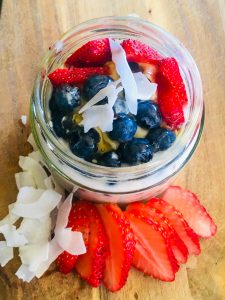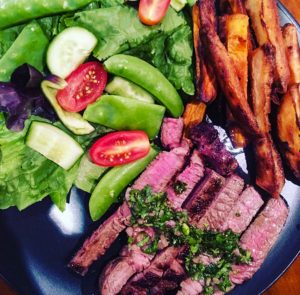Ankylosing spondylitis (AS) is an auto immune disease that causes the vertebrae of the spine to fuse together resulting in loss of mobility and pain. Research has found that although there is a genetic predisposition to ankylosing spondylitis, environmental factors play a larger role in developing the disease and, like most auto immune conditions, there is a strong link between gut health and the disease.
Genetically AS is associated with the gene HLA-B27. In fact, over 80% of sufferers are known to have this gene. What is interesting though, is that only about 8% of carriers for this gene actually develop ankylosing spondylitis and so research is focused on investigating the environmental triggers that play a role in switching the gene on or off.
Ankylosing Spondyltis and the gut connection
Studies show that individuals with ankylosing spondylitis have a greater abundance of the bacterium Klebsiella and that there appears to be a correlation between the overgrowth these bacteria in the gut and a subsequent migration of some of the microbes into the circulation that triggers inflammation. The problem for those with the HLA-B27 gene is that the body is more likely to confuse the attack on the microbe with cells in the body itself. This is hypothesised to be due to similarities in molecules found on both the bacterium and the gene, which results in antibodies accidentally binding to the gene.
Ankylosing Spondylitis and the diet connection
 Diet plays a huge role in determining the composition of the microbiome in the gut. Research has found that high starch diets promote the growth of Klebsiella, as the starch can reach the large intestine still partially undigested, providing fuel for the growth of Klebsiella and other such undesirable bacteria. Klebsiella proliferates as it works to break down the starch into simple sugars that the body can absorb. In contrast, those individuals who consume a high protein, low starch diet show significantly lower levels of Klebsiella, as the optimal food source for the bacteria is not supplied in this case.
Diet plays a huge role in determining the composition of the microbiome in the gut. Research has found that high starch diets promote the growth of Klebsiella, as the starch can reach the large intestine still partially undigested, providing fuel for the growth of Klebsiella and other such undesirable bacteria. Klebsiella proliferates as it works to break down the starch into simple sugars that the body can absorb. In contrast, those individuals who consume a high protein, low starch diet show significantly lower levels of Klebsiella, as the optimal food source for the bacteria is not supplied in this case.
Managing Ankylosing Spondylitis
1. Without a doubt get some support
It is tempting to surf the net and dabble in making changes with diet and nutrients but it really isn’t the same as having someone step you through the process, check on your progress, order tests and prescribe herbs and nutrients.
2. Reduce your starch and carbohydrate intake
The presence of bacteria in the large intestine is a vital component of good health. However, the type and proportion of microbes that reside in the gut are a strong determinant of digestive health and the impact this will have on the immune system. Therefore, reducing sugars and starches whilst increasing high cellulose vegetables like greens will promote the growth of beneficial bacteria.
3. Heal the gut
Long term inflammation and poor dietary choices are commonly associated with intestinal permeability or “leaky gut”, as naturopaths have long referred to this now well researched dysfunction of the gut. Basically this means that substances which should not leave the gut, such as partially digested proteins or bacteria, are able to enter the systemic circulation and trigger inflammation due to disruption of the integrity of the intestinal wall. A gut restoration program aims to reduce this permeability and restore the integrity of the gut wall. Nutrients such as slippery elm, glutamine and quality probiotics all play a role in this process.
4. Support the Immune System
Herbal medicine offers a range of herbs that assist with reducing inflammation and regulating the immune system. Dulling the inflammatory response is a key factor in reducing pain and limiting the progression of the disease. Such herbs include Astragalus, Tumeric and Devils Claw.
Cindy Morris
 With over 15 years clinical experience, Cindy brings a wealth of knowledge and understanding to her clients with Ankylosing spondylitis, as well as other autoimmune and gut health related problems.
With over 15 years clinical experience, Cindy brings a wealth of knowledge and understanding to her clients with Ankylosing spondylitis, as well as other autoimmune and gut health related problems.
Our clinic is situated in Wavell Heights, on the northside of Brisbane, with easy access from north and south and plenty of on street parking. Your first Naturopathy consultations are up to 1.5 hours and cost $175. Follow-up consultations are between 30-60 minutes depending on what is required. You can email or call us if you would like to make a booking with one of our naturopaths or you are welcome to click on the link below to book online.
Common conditions that Cindy works with:
- Abdominal pain
- Acne
- Allergies
- Ankylosing spondylitis
- Asthma
- Autoimmune disease
- Bloating
- Common colds
- Constipation
- Crohns
- Diarrhoea
- Digestive Health
- Eczema
- Food sensitivities
- Gut Health
- Hashimoto’s
- Inflammatory Bowel Disorders
- Irritable Bowel Syndrome
- Multiple Sclerosis
- Rheumatoid Arthritis
- Thyroid disorders
- Weight management
Share the love

About Cindy
Cindy Morris has been working as a naturopath for over 15 years, she is currently adding to her clinical skills with further study at Griffith University. Her clinical focus is around chronic fatigue, thyroid health and auto-immune conditions.




